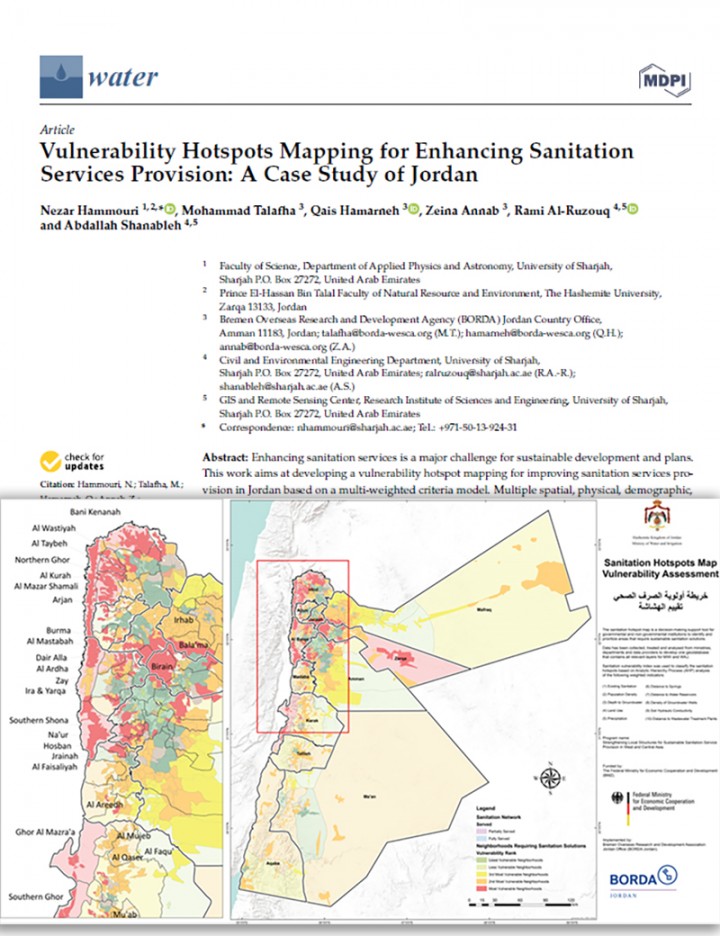Vulnerability Hotspots Mapping for Enhancing Sanitation Services Provision: A Case Study of Jordan
Nezar Hammouri, Mohammad Talafha, Qais Hamarneh, Zeina Annab, Rami Al-Ruzouq, Abdallah Shanableh (2022)

Published in: 2022
Pages: 19
Publisher:
BORDA Jordan
Author:
Nezar Hammouri, Mohammad Talafha, Qais Hamarneh, Zeina Annab, Rami Al-Ruzouq, Abdallah Shanableh
Uploaded by:
Mohammad Talafha
1523 Views
16 Downloads
Location of library entry
Enhancing sanitation services is a major challenge for sustainable development and plans.
This work aims at developing a vulnerability hotspot mapping for improving sanitation services provision
in Jordan based on a multi-weighted criteria model. Multiple spatial, physical, demographic,
social, economic, and sanitation data were collected and compiled using GIS. We also considered
experts’ and stakeholders’ opinions to determine the necessary indicators needed to develop Sanitation
Hotspot Index (SHI). We used the Analytic Hierarchy Process (AHP) analysis to assign the
relative weights of ten criteria. We also checked the consistency of AHP results. We found that the
sanitation and population density got the highest relative weights, while soil hydraulic conductivity
got the lowest. Based on the results of AHP, we developed two SHI mapping for two administrative
levels: district and neighborhood levels. The maps classified the sanitation vulnerability into five
classes ranging from most vulnerable to least vulnerable. The developed SHI maps can be used as a
decision support tool for decision-makers and planners to allocate the necessary funds and orient
the aids from donors and international agencies to enhance sanitation services in the country’s most
vulnerable areas.
Additional information
BORDA Jordan is pleased to announce that their article "Vulnerability Hotspots Mapping for Enhancing Sanitation Services Provision: A Case Study of Jordan" has been published in Water MDPI Journal and is available online (see further reading).
This map is an important tool that supports and guides decision-makers in governmental and private agencies, donors and international organizations in planning and implementing #sanitation projects based on need and priority in #Jordan.
The resulting map identifies priority areas that require centralized and decentralized sanitation solutions at the Neighborhood level across the Kingdom by assessing the current environmental and sanitation situation and analysing indicators using Geographic Information Systems (#GIS).
BORDA Jordan would like to thank the Ministry of Water and Irrigation and the Water Authority of Jordan for sharing data, cooperation and facilitation.
This work is a component of the regional program “Strengthening Local Structures for Sustainable Sanitation Services Provision in West and Central Asia” funded by the Federal Ministry for Economic Cooperation and Development (BMZ) Bundesministerium für wirtschaftliche Zusammenarbeit und Entwicklung (BMZ) وزارة المياه والري - سلطة المياه - سلطة وادي الاردن
#BORDA #assessment #gismapping #sdg6 #sanitationforall #decisionmaking #policymaking #jordan
يسعد جمعية بريمن للأبحاث والتنمية عبر البحار - بوردا مكتب الأردن الاعلان
عن نشر مقالتنا العلمية بعنوان:
"Vulnerability Hotspots Mapping for Enhancing Sanitation Services Provision: A Case Study of Jordan"
الرابط: https://lnkd.in/ekwrkV5J
تعد هذه الخريطة أداة مهمة تدعم توجه صناع القرار في الجهات الحكومية والخاصة والجهات المانحة والمنظمات الدولية في تخطيط وتنفيذ مشاريع حلول الصرف الصحي حسب الأولوية حيث تحدد خريطة الهشاشة المناطق ذات الأولوية في حلول الصرف الصحي المركزية واللامركزية على مستوى الأحياء في المملكة كافة عن طريق تقييم الوضع البيئي والصرف الصحي الحالي وتحليل المؤشرات باستخدام نظم المعلومات الجغرافية.
تتقدم بوردا الأردن بالشكر لوزارة المياه والري وسلطة مياه الأردن على مشاركة البيانات والتعاون والتسهيلات المقدمة من قبلهم لانجاز هذا العمل. هذا العمل هو أحد مكونات البرنامج الإقليمي "تعزيز المؤسسات المحلية لتوفير خدمات الصرف الصحي المستدامة في غرب ووسط آسيا" بتمويل من الوزارة الاتحادية للتعاون الاقتصادي والتنمية الالمانية
Bibliographic information
Nezar Hammouri, Mohammad Talafha, Qais Hamarneh, Zeina Annab, Rami Al-Ruzouq, Abdallah Shanableh (2022). Vulnerability Hotspots Mapping for Enhancing Sanitation Services Provision: A Case Study of Jordan. BORDA Jordan
Filter tags
Arabic Educators English German Journalists Middle East & North Africa Peri-urban Politicians and local decision makers Practitioners Research publications Rural Urban (entire city) Urban informal settlements (slums) Water (irrigation, process, other)














